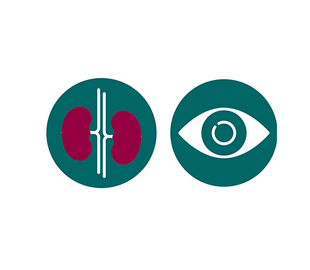Observations and results from population studies cannot always be compared and generalized, since the different cohorts usually have different access requirements for the study participants. In order to be able to evaluate the prevalence of diabetes-related complications and risk factors for cardiovascular diseases in recent-onset type 1 diabetes in adults, DZD researchers jointly evaluated two differently designed German cohorts. The study evaluated 1511 persons with type 1 diabetes from the prospective diabetes follow-up registry (DPV) and 268 volunteers of the prospective observational German Diabetes Study (GDS) with a known diabetes duration of less than one year. The age (36 years), gender distribution (41% female) and BMI (26 kg/m2) of the participants were similar in both cohorts.
The study showed that diabetic nephropathy and retinopathy are the most common complications of type 1 diabetes. Up to 10% of patients develop these within the first year after diagnosis. Both cohorts had, on average, well-controlled blood glucose levels but poor management of risk factors for complications such as high blood pressure and high levels of lipids in the blood (dyslipidemia).
"The present analysis of data from various German diabetes cohorts enables a better understanding of the distribution of risk factors and their connection with diabetes-related complications," said Prof. Dr. Reinhard W. Holl from the University of Ulm, a project partner of the German Center for Diabetes Research (DZD). "The study results underline the need for more stringent risk factor management at the time of type 1 diabetes diagnosis in order to prevent the development and progression of diabetes-related complications," said Prof. Dr. Julia Szendrödi, emphasizing a conclusion of the study. She is medical director of the Clinic for Endocrinology, Diabetology, Metabolic Diseases and Clinical Chemistry Heidelberg and head of the Clinical Study Center at the German Diabetes Study.
Original publication:
Zaharia, O. ...Szendroedi, J. and Holl, R. et al.: Comorbidities in Recent-Onset Adult Type 1 Diabetes: A Comparison of German Cohorts. Frontiers in Endocrinology, DOI: 10.3389/fendo.2022. 760778

